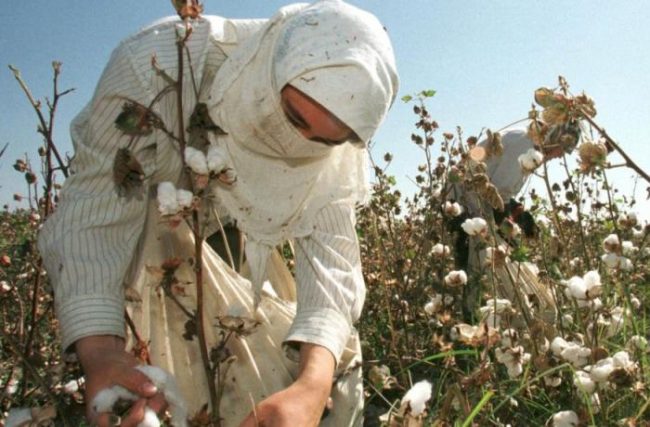After 13 years, Uzbek cotton farmers are celebrating the lifting of the international boycott of their products, with the confirmation of no longer using organized forced labor to harvest the economically vital crop.
It’s great news that the world’s biggest cotton producers, including major American clothing retailers such as Amazon, Gap, J.Crew, Target, and Walmart, that have been escalating in the recent past to fill in the deficit between consumption and production, while global production of cotton for 2021-2022 was around 26.52 million bales, global consumption was nearly 27 million-plus bales. This will help stabilize prices.
The U.S.-based Cotton Campaign, a coalition of more than 300 businesses and organizations, initiated the boycott in 2009. At that time, it said, the Uzbek authorities were “forcing over 1 million children and adults, including medical staff, public sector employees and students, to pick cotton every year during the harvest.”
The boycott ended after the Uzbek Forum for Human Rights, a Cotton Campaign partner, reported this spring that it found “no systemic or systematic, government-imposed forced labor during the cotton harvest” in 2021.
The Cotton Campaign said, “This historic achievement comes after years of persistent engagement by Uzbek activists, international advocates and multinational brands, together with a commitment by the government of Uzbekistan to end its use of forced labor.”
The campaign now urges end users to conduct human rights due diligence at all stages of production — at cotton farms, spinners, fabric mills and manufacturing units — and ensure to have “credible, independent mechanisms in place for forced labor prevention, monitoring, grievance and remedy.”
Also, The Cotton Campaign fights state-sponsored forced labor in Turkmenistan, which it defines as “one of the most closed and repressive countries in the world.
According to that “forces tens of thousands of public sector workers to pick cotton in hazardous and unsanitary conditions and extorts money from public employees to pay harvest expenses.”
Jonas Astrup, the International Labor Organization technical adviser in Tashkent, told VOA that freeing Uzbek cotton from systemic forced and child labor is a political victory for the country.

Basically the biggest root cause of forced labor was the state quota system for cotton production and official complicity in it. That has been changed but obviously it will take time.
But the system of production quotas for provinces, districts and farmers has gone away, and this is really the key.
The ILO has been monitoring child labor in Uzbekistan since 2013 and forced labor since 2015. It has a network of 17 independent civil society activists, including former political prisoners, who will continue to use tested tools and methodology.
Astrup said, “We have helped inspections grow from 200 to 400 labor inspectors. They are now issuing an annual report with data that is useful for policy and business decisions. They have the mandate to issue fines, investigate violations and submit cases for criminal prosecution.”
They can help Uzbekistan credibly develop its textile and garment industry and give assurance to international brands and retailers that they can start placing orders.
Meanwhile, the ILO and its partners will establish a Better Work Uzbekistan program, focusing on social dialogue mechanisms at factories and cotton-textile clusters, including collective bargaining and bringing employers and workers.
Hugh Williamson, director of Human Rights Watch’s Europe and Central Asia division, said Tashkent must lift restrictions on activists and NGOs “to enable them to monitor forced labor and ensure this terrible abuse does not return.”
On the other hand, Nazila Narbayeva, chair of the Senate of Uzbekistan, who has led efforts to end child labor by force, acknowledged that the country still faces many problems.
Narbayeva told VOA “Ensuring human rights and freedoms, especially labor rights, is one of the priorities of our development strategy. So we will strengthen our legal basis, bring our laws in line with international standards.”
At the same time, she said, we will continue to reform agriculture and develop our institutions with a strong monitoring system for policies based on reliable data and research.
















